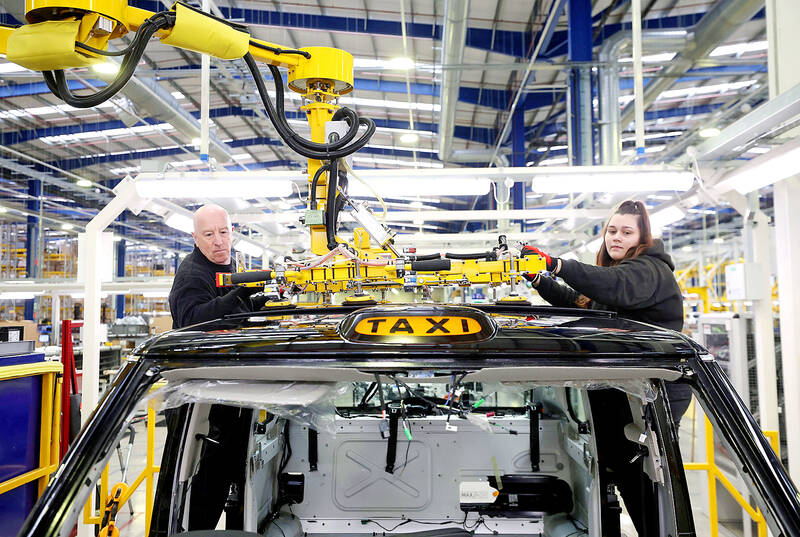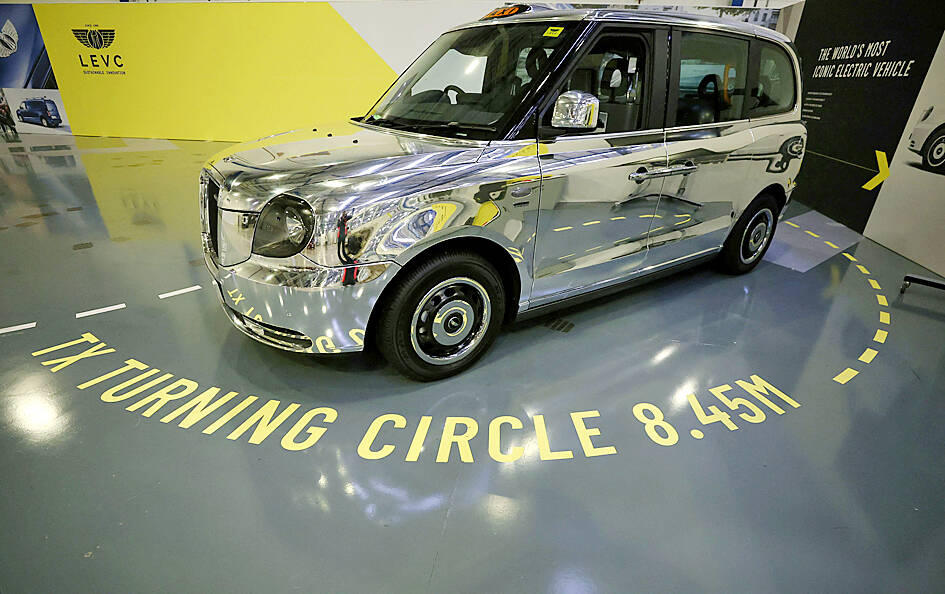China’s Geely Holding Group Co (吉利控股集團) is planning a big investment to turn the maker of London’s iconic black taxis into a high-volume, all-electric brand with a range of commercial and passenger vehicles, executives at the unit said.
London Electric Vehicle Co (LEVC) also aims to expand its suite of services, which include cars arranging their own maintenance and recognizing their owner’s interests to help them book activities.
“We need a developed product portfolio. We need to make big investments in terms of the technology and infrastructure,” LEVC chief executive Alex Nan (南聖良) said at the taxi maker’s headquarters in Coventry, central England. “Geely will make consistent investments into LEVC because this is a very unique project.”

Photo: Reuters
LEVC builds a hybrid taxi model that starts at around £66,000 (US$81,900), which has a battery providing 103km of range and a gasoline range-extender giving it a total range of over 480km. The company’s business was hit hard by the pandemic and it laid off 140 staff in October last year.
Nan said LEVC and Geely would seek to attract other investors to its zero-emission portfolio and would look to partner with other carmakers to develop new technology.
Executives said the size of Geely’s investment would be disclosed later. So far the Chinese group, which took full control of LEVC in 2013, has invested £500 million in it.

Photo: Reuters
“Geely fully supports the new transition strategy laid out by LEVC’s board and executive team,” Geely said in a statement.
In 2021, Geely launched a £2 billion investment in another unit, niche British luxury sports carmaker Lotus, to massively expand production of its sports cars and build high-end SUVs and sedans in Britain and China.
Geely is following a similar path in its plans to grow LEVC, executives said.
Britain’s EV ambitions were dealt a blow last week when startup Britishvolt, which had planned to build a major battery factory in northeast England, filed for administration.
“We need to make sure the UK environment as a whole is competitive and has its position on the world stage,” LEVC managing director Chris Allen said.

MULTIFACETED: A task force has analyzed possible scenarios and created responses to assist domestic industries in dealing with US tariffs, the economics minister said The Executive Yuan is tomorrow to announce countermeasures to US President Donald Trump’s planned reciprocal tariffs, although the details of the plan would not be made public until Monday next week, Minister of Economic Affairs J.W. Kuo (郭智輝) said yesterday. The Cabinet established an economic and trade task force in November last year to deal with US trade and tariff related issues, Kuo told reporters outside the legislature in Taipei. The task force has been analyzing and evaluating all kinds of scenarios to identify suitable responses and determine how best to assist domestic industries in managing the effects of Trump’s tariffs, he

TIGHT-LIPPED: UMC said it had no merger plans at the moment, after Nikkei Asia reported that the firm and GlobalFoundries were considering restarting merger talks United Microelectronics Corp (UMC, 聯電), the world’s No. 4 contract chipmaker, yesterday launched a new US$5 billion 12-inch chip factory in Singapore as part of its latest effort to diversify its manufacturing footprint amid growing geopolitical risks. The new factory, adjacent to UMC’s existing Singapore fab in the Pasir Res Wafer Fab Park, is scheduled to enter volume production next year, utilizing mature 22-nanometer and 28-nanometer process technologies, UMC said in a statement. The company plans to invest US$5 billion during the first phase of the new fab, which would have an installed capacity of 30,000 12-inch wafers per month, it said. The

Taiwan’s official purchasing managers’ index (PMI) last month rose 0.2 percentage points to 54.2, in a second consecutive month of expansion, thanks to front-loading demand intended to avoid potential US tariff hikes, the Chung-Hua Institution for Economic Research (CIER, 中華經濟研究院) said yesterday. While short-term demand appeared robust, uncertainties rose due to US President Donald Trump’s unpredictable trade policy, CIER president Lien Hsien-ming (連賢明) told a news conference in Taipei. Taiwan’s economy this year would be characterized by high-level fluctuations and the volatility would be wilder than most expect, Lien said Demand for electronics, particularly semiconductors, continues to benefit from US technology giants’ effort

‘SWASTICAR’: Tesla CEO Elon Musk’s close association with Donald Trump has prompted opponents to brand him a ‘Nazi’ and resulted in a dramatic drop in sales Demonstrators descended on Tesla Inc dealerships across the US, and in Europe and Canada on Saturday to protest company chief Elon Musk, who has amassed extraordinary power as a top adviser to US President Donald Trump. Waving signs with messages such as “Musk is stealing our money” and “Reclaim our country,” the protests largely took place peacefully following fiery episodes of vandalism on Tesla vehicles, dealerships and other facilities in recent weeks that US officials have denounced as terrorism. Hundreds rallied on Saturday outside the Tesla dealership in Manhattan. Some blasted Musk, the world’s richest man, while others demanded the shuttering of his